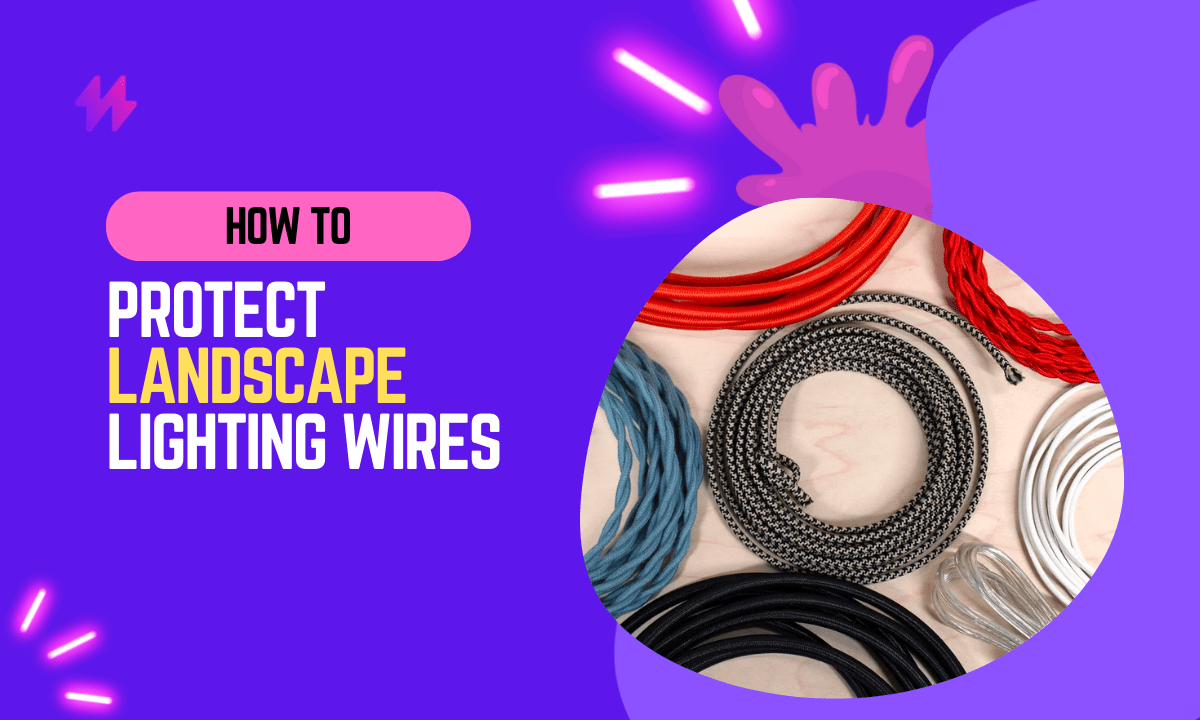How to Protect Landscape Lighting Wire

Landscape lighting can add a lot of beauty and charm to your home, and it’s a great way to make your property stand out from the rest. However, if you don’t take the proper precautions, you could run into some big problems.
In this article, we will discuss how to protect landscape lighting wires from weather damage, rodents, and other hazards. Let’s get started!
Protect Landscape Lighting Wire from Weather Damage
One of the biggest threats to landscape lighting wires is weather damage. Water and sunlight can both wreak havoc on wiring, causing it to break down and become brittle over time.
To protect your landscape lighting wire from weather damage, you should:
- Use a Waterproof sealant: A waterproof sealant will help keep water out of your wiring, and it will also provide some protection from sunlight.
- Use heat shrink tubing: Heat shrink tubing is a great way to protect your landscape lighting wire from both water and sunlight. It’s easy to install, and it will give your wiring an extra layer of protection.
- Use a UV-resistant jacket: If you live in an area with a lot of sunlight, a UV-resistant jacket will help keep your landscape lighting wire from deteriorating.
You may also like to know How to hide Under Cabinet lighting wires
Protect Landscape Lighting Wire from Rodents
Another big threat to landscape lighting wire is rodents. Mice and rats love to chew on wiring, and they can cause a lot of damage in a short amount of time.
To protect your landscape lighting wire from rodents, you should:
- Use Rodent-Resistant Wire: There are special types of wire that are designed to resist chewing from rodents. This type of wire is usually more expensive, but it’s worth the investment if you want to keep your wiring safe.
- Use Rodent Traps: If you have a rodent problem, setting out some traps can help catch the culprits before they have a chance to damage your wiring.
- Use a Wire Mesh: A wire mesh can also help keep rodents away from your landscape lighting wire. Just make sure that the mesh is small enough so that mice and rats can’t squeeze through.
Protect Landscape Lighting Wire from Other Hazards
In addition to weather damage and rodents, there are other hazards that can damage landscape lighting wires. These include lawnmowers, cars, and even curious children.
To protect your landscape lighting wire from these hazards, you should:
- Burlap or plastic tubing: Covering your landscape lighting wire with burlap or plastic tubing can help protect it from damage. Just make sure that the tubing is secure so that it doesn’t get dislodged.
- Wire clips: Wire clips can help keep your landscape lighting wire in place, and they also provide some protection from damage.
- Electrical tape: Electrical tape can be used to cover exposed wires, and it will also help protect your wiring from damage.
How to Safely Burry Landscape Lighting Wire?
In some cases, you may need to bury your landscape lighting wire. This is usually done when running wire through an area that is difficult to access.
When burying landscape lighting wire, you should:
- Use a trencher: A trencher is a tool that can be used to dig a trench for your wiring. This will make it easier to bury your wiring, and it will also help protect the wire from damage.
- Use conduit: A conduit is a type of piping that can be used to protect your wiring as it runs underground. Just make sure that the conduit is properly sealed so that water doesn’t get in.
- Use buried cable: Buried cable is specially designed to be buried underground. This type of cable is more expensive, but it’s worth the investment if you need to bury your wiring.
Protecting your landscape lighting wire is important if you want it to last for years to come. By taking some simple precautions, you can keep your wiring safe from weather damage, rodents, and other hazards. Just remember to use the appropriate type of protection for each situation, and your landscape lighting wire will be sure to stay in good condition.
However, if you do run into problems, don’t hesitate to call a professional for help.
Conclusion
In conclusion, effectively protecting landscape lighting wire is crucial for maintaining the integrity and longevity of your outdoor lighting system. Exposure to the elements, accidental damage during yard activities, and potential interference from wildlife can all compromise the functionality of your landscape lighting. To safeguard these essential components, it is imperative to utilize proper wiring techniques and protective materials from the outset. Burying the wires at a sufficient depth is one of the most effective strategies to prevent accidental damage from lawn care activities or curious animals. Ideally, wires should be buried about six inches underground and possibly encased in conduit for added protection in areas where they may be exposed to more severe environmental stressors.
Furthermore, the use of high-quality, UV-resistant, and waterproof materials for all exposed wiring and connections is essential. These materials help prevent degradation caused by sunlight and moisture, two prevalent challenges in outdoor environments. Additionally, incorporating routine inspections into your landscape maintenance schedule ensures early detection of any potential issues, such as fraying or water damage, before they lead to system failure. These inspections provide an opportunity to address minor issues promptly, thus avoiding more significant complications down the line. By taking these proactive measures, homeowners can ensure that their landscape lighting remains a reliable and attractive feature of their outdoor spaces, enhancing both the beauty and functionality of their property while minimizing the need for costly repairs and replacements over time.






